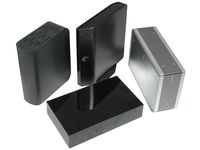External Storage: Terabyte Drives Compared
Value-Added External Terabyte Storage
It’s been interesting to watch storage prices drop in recent months. Hard drives as large as 750 GB have already fallen below $100 and we expect terabyte models to be available at roughly that price during the holiday season. External hard drives used to cost significantly more than bare hard drives. But prices in this market segment have dropped as third-party vendors started offering custom-made storage solutions at more attractive price points than conventional drive makers. Leading hard drive manufacturers are offering some excellent external terabyte drives to satisfy your storage demands, and they’re priced at a reasonable $200 on average.
External Means Flexible
The conventional ways to increase storage capacity are to install a second hard drive in your PC or to replace your existing hard drive with one that provides more storage capacity. However, availability of inexpensive, quick interfaces such as FireWire and eSATA makes permanent installation obsolete, and they allow most consumers to purchase storage products they can use much more flexibly. You can use an external hard drive with multiple PCs or notebooks, to store data in a central location, or to store single-system backups. But more importantly, external drives are semi-portable, which means your data isn’t chained to one PC hosting the storage device. The USB 2.0 interface is ubiquitous, but it isn’t the best choice anymore, as it bottlenecks every external drive and most portable hard drives using 2.5” and 1.8” hard drives.
Throughput Counts
A good external hard drive will not only provide the storage capacity you need, but will also deliver high throughput, as well as low power consumption and a useful software bundle. Throughput is critical—you don’t want large copy jobs or backups to take all day. Think about it: With hard drive capacities of 1 TB (1,000 GB) and heading up to 1.5 TB (1,500 GB), who has time to wait?
Must-Haves
Any decent external hard drive comes equipped with USB 2.0 for compatibility with just about any host system. In addition, eSATA drives have also become essential, and many PCs now come with at least one SATA connector for an eSATA drive. Many external drives also feature a hardware power switch, so you can physically switch them off when you’re not using them. Finally, all other things being equal, compare product design and software bundle .
Get Tom's Hardware's best news and in-depth reviews, straight to your inbox.
We review the LaCie External Hard Disk, Design by Neil Poulton, Seagate FreeAgent XTreme, SimpleTech ProDrive, and Western Digital My Book Home Edition.
Current page: Value-Added External Terabyte Storage
Next Page LaCie Hard Disk, Design by Neil Poulton